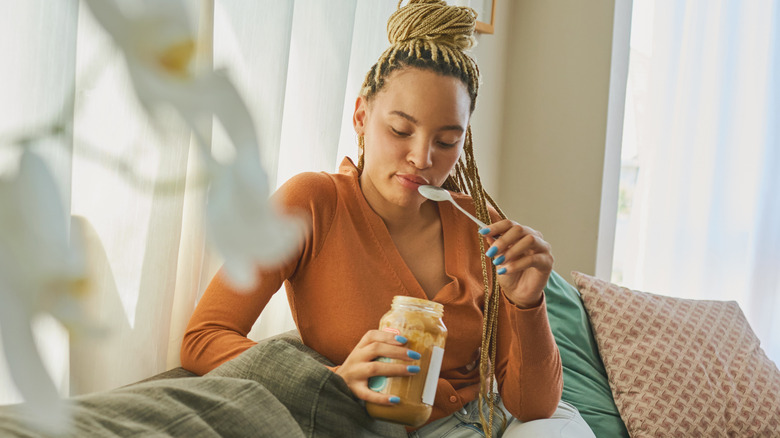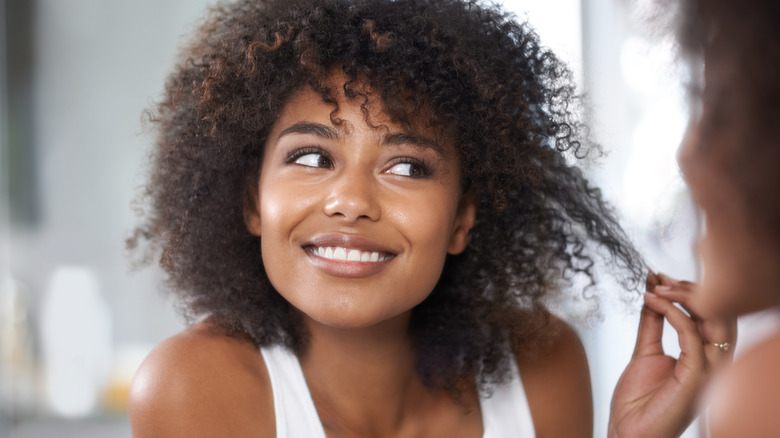What Happens To Your Hair When You Eat Peanut Butter Every Day
You might have heard bad things about peanut butter that have led you to cut it out of your diet. However, peanut butter is good for you when eaten in moderation. You can even eat it daily to get a healthy dose of vitamins and minerals. Like many things in life, it depends on the kind of peanut butter you buy. Some brands might be tasty, but the nutritional value is drastically decreased by the added sugars, salt, oils, and dreaded trans fats, so they should stay out of your shopping cart, per WebMD.
However, that doesn't mean that all peanut butter varieties are evil. At its core, peanut butter is simply ground-up peanuts. When you stock your cart with organic and natural spreads, it can be a healthy treat when added to a piece of heart-healthy bread or loaded on celery. In addition to boasting 22 grams of protein in a 100-gram serving, it also contains minerals, like calcium, and vitamins, like vitamin E, that are good for everything from your bones to your hair and skin, per the U.S. Department of Agriculture (USDA). In fact, the biotin, vitamin E, monosaturated fats, and selenium in peanut butter can help you meet your daily nutrition goals and make your hair grow faster, shine more, and keep your scalp healthy.
Your palate and hair agree that eating peanut butter daily benefits you. Now, we'll walk you through how these different vitamins, minerals, and fats benefit your hair.
Biotin in peanut butter promotes healthy growth
Among the healthy vitamins in peanut butter, you'll find nearly 90 micrograms of biotin. Biotin has made its rounds on social media and within news outlets for being one of the targeted vitamins that help with hair growth. However, since you can't always trust the media, it's vital to look at the science.
Biotin is an essential B vitamin found in meats, fish, and nuts that is vital for protein synthesis, gene regulation, and cell signaling, states the National Institutes of Health (NIH). A 2017 review in Skin Appendage Disorders scanned research on PubMed discussing the effectiveness of biotin and found 18 case reports that showed hair growth improvement after receiving it. The possible reason could come down to biotin deficiency since biotin is required for keratin production.
Since the NIH states the body only needs a recommended amount of 30 micrograms a day, getting a little boost in the biotin department by eating peanut butter might help give you that thick, shiny hair you crave.
Peanut butter's vitamin E supports a healthy scalp
You can have the healthiest hair in the world, but when there are problems with your scalp, those luxurious follicles can't find their way through. Let vitamin E come to your rescue.
Vitamin E isn't just one vitamin, but a group of fat-soluble vitamins known for their antioxidant properties, states NIH. You know that free radicals and stress are harmful to your scalp; well, antioxidants protect your delicate scalp skin cells from these stressors like pollution and UV rays, which leaves you with a healthier scalp. Additionally, 2010 research in Tropical Life Sciences Research showed that the supplementation of tocotrienols, a type of vitamin E, helped with the participants' hair loss because the antioxidants most likely reduced the "oxidative stress on the scalp."
Peanut butter isn't brimming with vitamin E, but 100 milligrams contains about 5 milligrams, which can go far in helping you to meet the 11 milligrams recommended daily by the NIH. You can also mix it up to get more vitamin E by adding a handful of walnuts to your PB&J sandwich or throwing a bit of spinach into your peanut butter smoothie.
Monosaturated fats keep hair shiny
One of the reasons you might have taken peanut butter off the menu was to cut fat out of your life. There is no denying that peanut butter has fat (100 grams of peanut butter has 49 grams of total fat), but it's essential to remember that not all fat is bad. Trans fats and saturated fats are the ones you need to watch out for since they can lead to high levels of "bad" cholesterol and a higher risk of heart disease (per U.S. Centers for Disease Control and Prevention). Peanut butter doesn't have trans fats (per U.S. Department of Agriculture). However, it does have saturated fats, so moderation is vital in making sure the saturated fat in peanut butter stays in the healthy range. Cardiologist Dr. Dennis Bruemmer told the Cleveland Clinic, "A two-tablespoon serving of peanut butter has a couple of grams of saturated fats but when you eat half the jar, that becomes an issue." So, for your hair and body, make sure to watch your portions.
However, it's important to note that peanut butter is also full of monosaturated fats. According to the AHA, they can benefit your health by reducing your risk of high cholesterol. Additionally, per 2018 research in the Journal of Cosmetic Science, saturated and unsaturated fatty acids are necessary to keep the hair shiny, healthy, and manageable since they make up 85% of the hair's lipid content. But lipids are removed by everyday management of your hair, like styling and washing, so it's essential to replenish them in your diet to maintain the strength and shine of the hair and avoid hair fatigue. Additionally, Dr. Michael Barnish, head of genetics and nutrition at REVIV London, told Daily Mail, "Nutrients are important at [for] keeping the hair from looking dull. When the cells of the hair follicle have adequate levels of 'good' fats then it can nourish the hair strand well, resulting in bright and vibrant hair."
Selenium in peanut butter is good for hair
Getting your daily peanut butter fix is also good for adding selenium to your life, which your hair just loves. According to Harvard T.H. Chan School of Public Health, selenium is a natural mineral found in meats, seafood, and nuts, which protects against cell damage and assists in DNA creation. It's also needed by the body to maintain your silky locks.
Research in 2018 by the International Journal of Trichology found selenium might play a role in alopecia (hair loss). Mice on a selenium-restricted diet experienced hair impairment because the antioxidative properties protecting the hair follicle are lost when selenoproteins are depleted. Additionally, 2016 research in Menopause Review/Przegląd Menopauzalny found that selenium plays a role in hair growth and menopausal women experiencing hair problems should pay attention to their diet to ensure they are getting necessary minerals, like selenium, along with zinc, magnesium, and calcium.
Furthermore, selenium is one of the nutrients that supports the thyroid, which plays a significant role in hair growth. Research published in 2017 in the International Journal of Endocrinology found that your thyroid has the most selenium and uses it to metabolize thyroid hormones and for antioxidant function.





